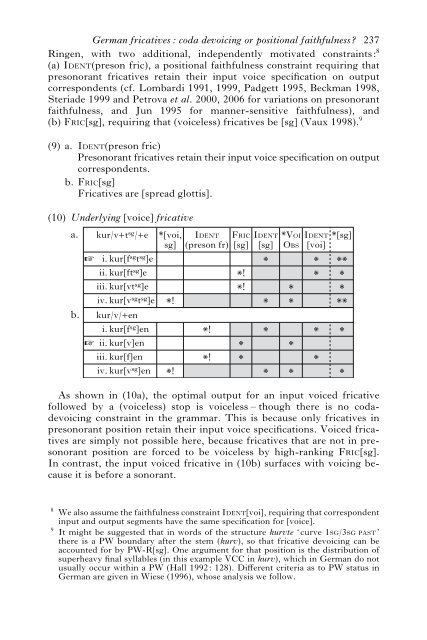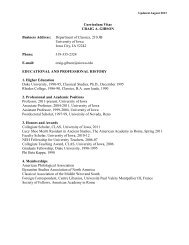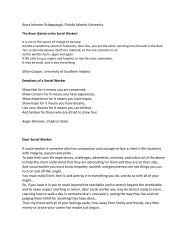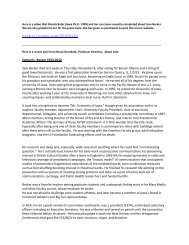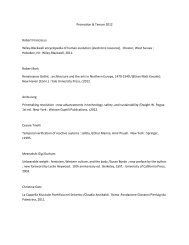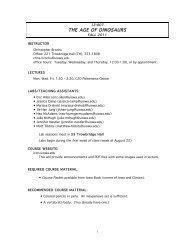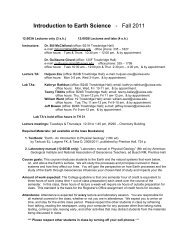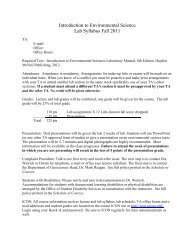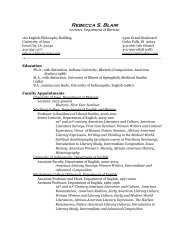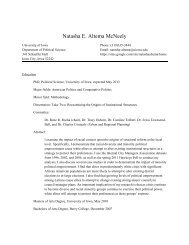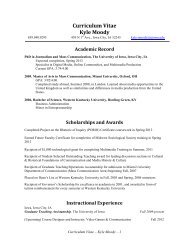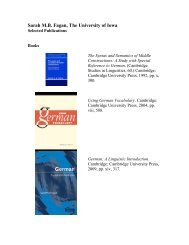German fricatives: coda devoicing or positional faithfulness?
German fricatives: coda devoicing or positional faithfulness?
German fricatives: coda devoicing or positional faithfulness?
Create successful ePaper yourself
Turn your PDF publications into a flip-book with our unique Google optimized e-Paper software.
<strong>German</strong> <strong>fricatives</strong>: <strong>coda</strong> <strong>devoicing</strong> <strong>or</strong> <strong>positional</strong> <strong>faithfulness</strong>? 237<br />
Ringen, with two additional, independently motivated constraints:8<br />
(a) IDENT(preson fric), a <strong>positional</strong> <strong>faithfulness</strong> constraint requiring that<br />
preson<strong>or</strong>ant <strong>fricatives</strong> retain their input voice specification on output<br />
c<strong>or</strong>respondents (cf. Lombardi 1991, 1999, Padgett 1995, Beckman 1998,<br />
Steriade 1999 and Petrova et al. 2000, 2006 f<strong>or</strong> variations on preson<strong>or</strong>ant<br />
<strong>faithfulness</strong>, and Jun 1995 f<strong>or</strong> manner-sensitive <strong>faithfulness</strong>), and<br />
(b) FRIC[sg], requiring that (voiceless) <strong>fricatives</strong> be [sg] (Vaux 1998).9<br />
(9) a. Ident(preson fric)<br />
Preson<strong>or</strong>ant <strong>fricatives</strong> retain their input voice specification on output<br />
c<strong>or</strong>respondents.<br />
b. Fric[sg]<br />
Fricatives are [spread glottis].<br />
(10) Underlying [voice] fricative<br />
a.<br />
b.<br />
<br />
kur/v+tsg/+e<br />
i. kur[fsgtsg]e<br />
ii. kur[ftsg]e<br />
iii. kur[vtsg]e<br />
iv. kur[vsgtsg]e<br />
*[voi,<br />
sg]<br />
*!<br />
Ident<br />
(preson fr)<br />
Fric<br />
[sg]<br />
*!<br />
*!<br />
kur/v/+en<br />
i. kur[fsg]en<br />
*!<br />
ii. kur[v]en<br />
*<br />
iii. kur[f]en<br />
*! *<br />
iv. kur[vsg]en *!<br />
Ident<br />
[sg]<br />
*<br />
*<br />
*Voi<br />
Obs<br />
*<br />
*<br />
*<br />
*<br />
Ident<br />
[voi]<br />
*<br />
*<br />
*<br />
*<br />
*[sg]<br />
As shown in (10a), the optimal output f<strong>or</strong> an input voiced fricative<br />
followed by a (voiceless) stop is voiceless – though there is no <strong>coda</strong><strong>devoicing</strong><br />
constraint in the grammar. This is because only <strong>fricatives</strong> in<br />
preson<strong>or</strong>ant position retain their input voice specifications. Voiced <strong>fricatives</strong><br />
are simply not possible here, because <strong>fricatives</strong> that are not in preson<strong>or</strong>ant<br />
position are f<strong>or</strong>ced to be voiceless by high-ranking FRIC[sg].<br />
In contrast, the input voiced fricative in (10b) surfaces with voicing because<br />
it is bef<strong>or</strong>e a son<strong>or</strong>ant.<br />
*<br />
*<br />
**<br />
*<br />
*<br />
**<br />
*<br />
*<br />
8 We also assume the <strong>faithfulness</strong> constraint IDENT[voi], requiring that c<strong>or</strong>respondent<br />
input and output segments have the same specification f<strong>or</strong> [voice].<br />
9 It might be suggested that in w<strong>or</strong>ds of the structure kurvte ‘curve 1SG/3SG PAST’<br />
there is a PW boundary after the stem (kurv), so that fricative <strong>devoicing</strong> can be<br />
accounted f<strong>or</strong> by PW-R[sg]. One argument f<strong>or</strong> that position is the distribution of<br />
superheavy final syllables (in this example VCC in kurv), which in <strong>German</strong> do not<br />
usually occur within a PW (Hall 1992: 128). Different criteria as to PW status in<br />
<strong>German</strong> are given in Wiese (1996), whose analysis we follow.


